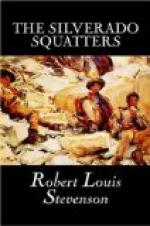I had no idea, at the time I made his acquaintance, what an important person Kelmar was. But the Jew store-keepers of California, profiting at once by the needs and habits of the people, have made themselves in too many cases the tyrants of the rural population. Credit is offered, is pressed on the new customer, and when once he is beyond his depth, the tune changes, and he is from thenceforth a white slave. I believe, even from the little I saw, that Kelmar, if he choose to put on the screw, could send half the settlers packing in a radius of seven or eight miles round Calistoga. These are continually paying him, but are never suffered to get out of debt. He palms dull goods upon them, for they dare not refuse to buy; he goes and dines with them when he is on an outing, and no man is loudlier welcomed; he is their family friend, the director of their business, and, to a degree elsewhere unknown in modern days, their king.
For some reason, Kelmar always shook his head at the mention of Pine Flat, and for some days I thought he disapproved of the whole scheme and was proportionately sad. One fine morning, however, he met me, wreathed in smiles. He had found the very place for me— Silverado, another old mining town, right up the mountain. Rufe Hanson, the hunter, could take care of us—fine people the Hansons; we should be close to the Toll House, where the Lakeport stage called daily; it was the best place for my health, besides. Rufe had been consumptive, and was now quite a strong man, ain’t it? In short, the place and all its accompaniments seemed made for us on purpose.
He took me to his back door, whence, as from every point of Calistoga, Mount Saint Helena could be seen towering in the air. There, in the nick, just where the eastern foothills joined the mountain, and she herself began to rise above the zone of forest— there was Silverado. The name had already pleased me; the high station pleased me still more. I began to inquire with some eagerness. It was but a little while ago that Silverado was a great place. The mine—a silver mine, of course—had promised great things. There was quite a lively population, with several hotels and boarding-houses; and Kelmar himself had opened a branch store, and done extremely well—“Ain’t it?” he said, appealing to his wife. And she said, “Yes; extremely well.” Now there was no one living in the town but Rufe the hunter; and once more I heard Rufe’s praises by the yard, and this time sung in chorus.
I could not help perceiving at the time that there was something underneath; that no unmixed desire to have us comfortably settled had inspired the Kelmars with this flow of words. But I was impatient to be gone, to be about my kingly project; and when we were offered seats in Kelmar’s waggon, I accepted on the spot. The plan of their next Sunday’s outing took them, by good fortune, over the border into Lake County. They would carry us so far, drop us at the Toll House, present us to the Hansons, and call for us again on Monday morning early.




